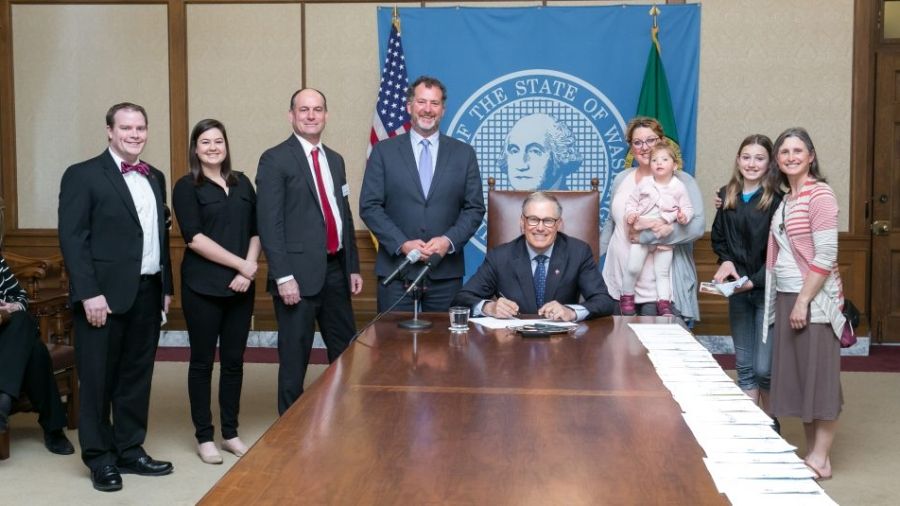
This fall, Washington became the first state in the country to license outdoor preschools. The move to embrace traditional elements of nature-based education—in particular, those having to do with risky play—has the potential to be a turning point for the field. Our ability to license nature-based and outdoor preschools has major implications for how we represent and insure our programs, and for who can access the work that we do. It also shows tacit support for the nature-based philosophy and has the potential to ease the crossover into public school classrooms. As many other states around the country consider moves to license outdoor and nature-based programs, there are valuable lessons to be learned by examining Washington as a model for future advocacy.
As a former director of Seattle’s first entirely outdoor preschool (Fiddleheads Forest School) and of the Washington Nature Preschool Association (WaNPA), I've had the chance to participate in outdoor preschool licensing discussions from an early stage. Washington is fairly unique in the US, in that programs operating for 4 hours or less are not required to be licensed. When my co-director Sarah Heller and I started our outdoor preschool at the University of Washington, we didn’t have to worry about restrictions on activities like tree climbing or working with ropes and tools. Given the freedom to grow, programs like ours flourished around the state. According to the Department of Children, Youth, and Families, or DCYF, there were over 40 outdoor preschools in Washington in 2018, and the number has been steadily rising ever since.
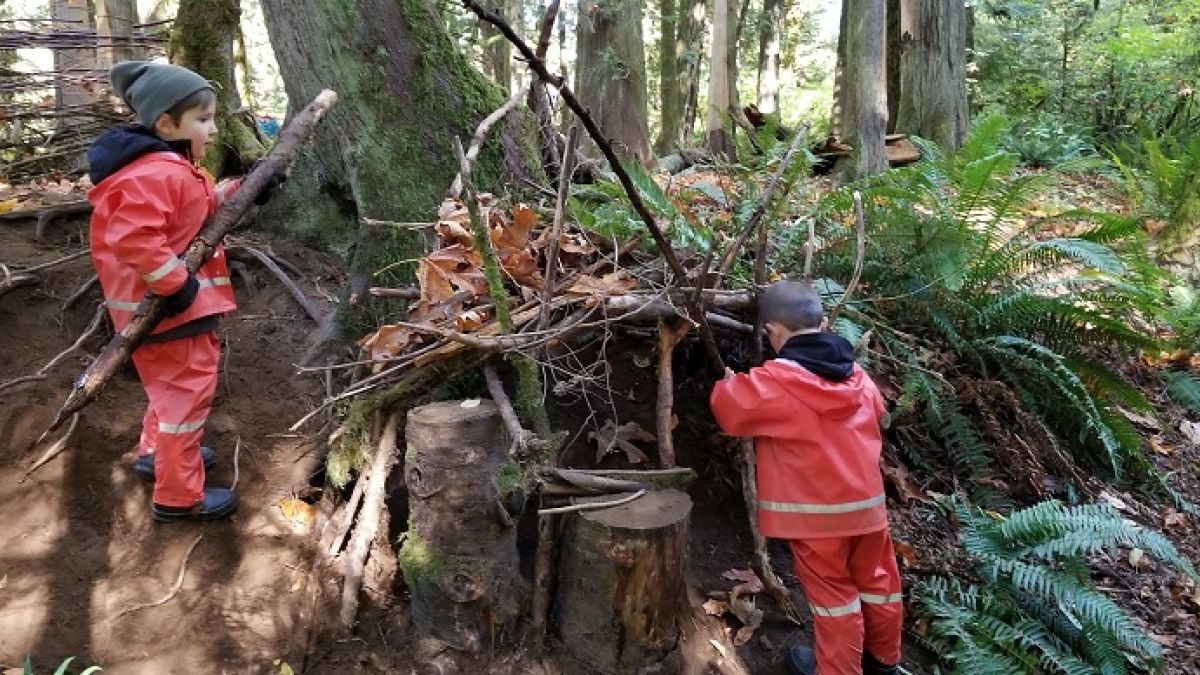
Photo by: Squaxin Island Child Development Center
Washington’s model of licensing cut both ways for outdoor preschools in particular. While the relative freedom accorded to part-day programs allowed us to exist in the first place, regulated elements of the Washington Administrative Code for licensed centers include specifications that are incompatible with many outdoor preschools. For example, the inclusion of building codes, the exclusion of insects and rodents, and the outright prohibition of elements of risky play, like tool usage and fire building, that are an important part of the nature-based approach.
This meant that outdoor and nature-based preschools were relegated to just 4 hours a day. For many, like Elise Valsquier of the Field and Forest Outdoor Preschool, the part-time schedule felt “just right.” Others questioned the impact that a limited schedule had on equitable access. In addition to limiting the number of hours unlicensed programs could operate, licensing restrictions also meant that outdoor preschools weren’t eligible for state-subsidized funding, which has distinct economic and social implications for families that want to access programming. At Fiddleheads, our limited hours meant that working families often had to either enlist nannies or extended family members to assist in after-care and transportation or risk being excluded entirely. Some schools worked with nearby community centers to patch together full-day care options, but problems persisted around consistency and quality of care, leaving many families without options. As time went on, it became increasingly clear that something needed to change.
In response, a group of outdoor preschool educators came together under the auspices of our regional organization, WaNPA, in the spring of 2016 to begin advocating for legislation to license outdoor preschools. We planned for a long haul. Many state officials warned us that passing legislation was likely to take years. To everyone’s surprise, outdoor preschool licensing quickly became a bi-partisan issue, and legislation passed within the first year to fund a 4-year pilot program to license outdoor and nature-based preschools. Soon after, the Outdoor Preschool Advisory Group was formed to ensure that outdoor and nature-based preschools and other stakeholders had a voice in the development of licensing standards. The group evolved into two cohorts—an implementation cohort of schools ready to license, and an observation cohort of programs not yet prepared to do so, who were willing to provide feedback and input on the development of licensing touchstone standards. Today, two programs— the Squaxin Island Child Development Center and the Kaleidoscope Preschool—have provisional licenses, and several others are on track to receive theirs by next fall.
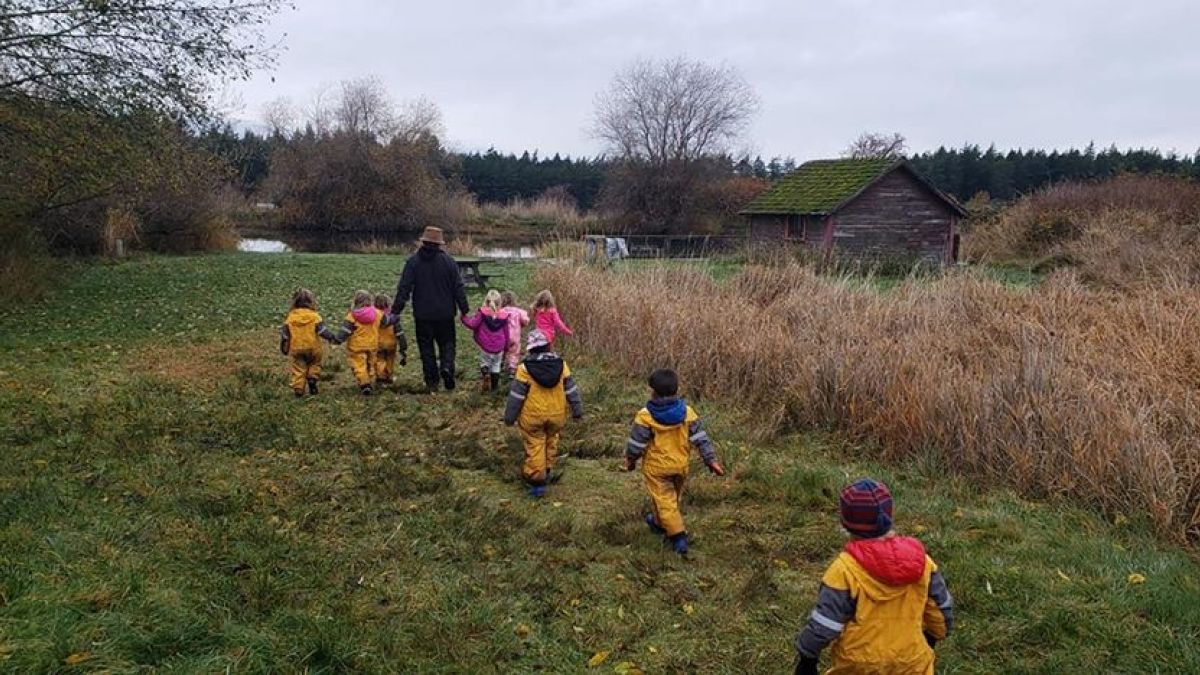
Photo by Kaleidoscope Preschool & Child Care Center
Licensing is already changing the landscape for how families engage with outdoor and nature-based preschool in Washington. Although some programs are still reticent about navigating all of the requirements, others have embraced it wholeheartedly. For Squaxin Island, which is also the first tribal school to be licensed under the new law, licensing made sense for cultural as well as liability reasons. According to Bert Miller, the school’s director, the benefits of licensing have been manifold. In addition to making sense from a “liability standpoint,” the development of their outdoor program "really helped us better connect with our tribal community because we’re engaging our kids with their culture and with the natural environment.”
Licensing has also improved accessibility. Programs participating in licensing can represent themselves in new ways, access new kinds of funding, and offer full-day programming. This year Squaxin Island was able to offer 5 fully-funded spots through the Early Childhood Education and Assistance Program, and next year they expect that number to increase to 12. At Kaleidoscope Preschool, the new regulations mean that the school can now offer a full-time outdoor preschool option 4 days a week. This potentially transformative step also opens the gate for similar legislation around the country, an important move toward equitable access for the field as a whole.
Today, as many states look to establish licensing regulations around nature-based learning and risky play, there are important lessons to be learned from what took place in Washington State. What follows are some of the key takeaways that we’ve learned in the process:
Take the time to organize: Throughout the advocacy process, the Washington Nature Preschool Association offered a means by which we could connect with others and represent our shared interests. Our combined knowledge and resources ensured that we were able to successfully advocate for the inclusion of many elements of nature-based education that are frequently considered to be essential--from working with fire and tools to climbing trees and exploring around bodies of water, to allowing for composting toilets and even “backcountry toileting” protocols. Having an organized body provided us with a safe space to advocate, communicate, and listen to the needs of our member schools.
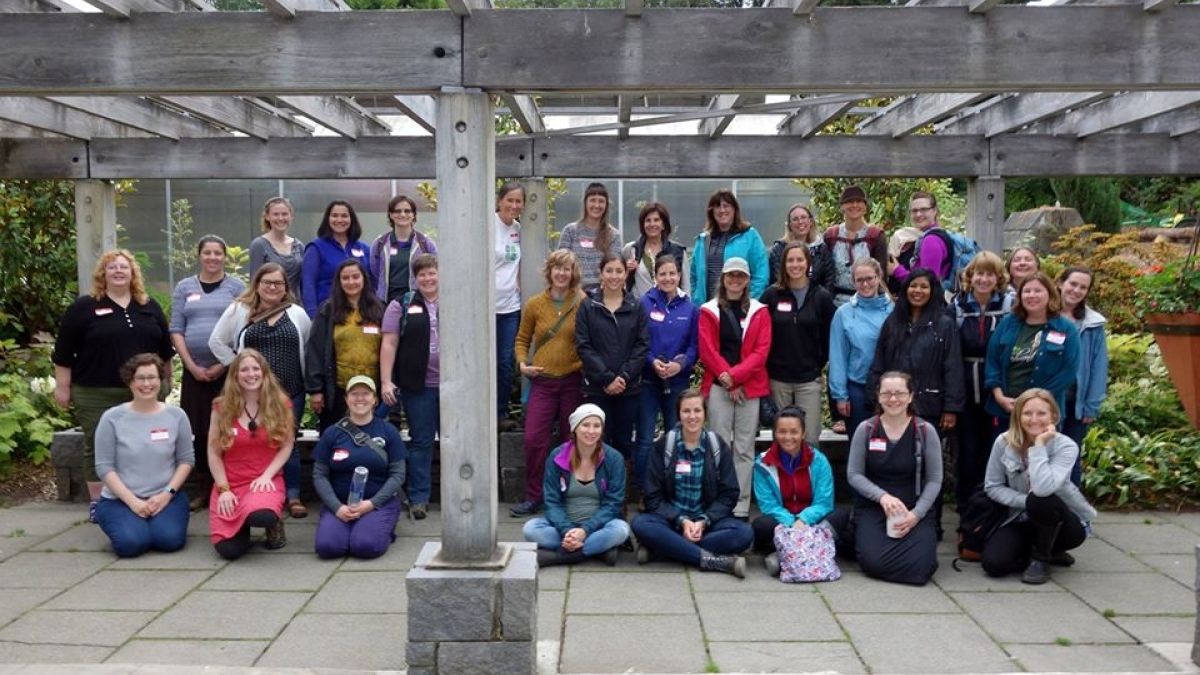
Washington Nature Preschool Association
Consider your message: Lawmakers listen to testimony all day long; clear talking points are critical to cut through the noise. In Washington, we put equity and accessibility at the center of our messaging, highlighted the value of nature-based education for learning and development, and spoke to the overwhelming demand for nature-based programming around the state.
Get to know the landscape: If you’re new to advocacy, the legislature can feel exceedingly complex and overwhelming to navigate. WaNPA worked with a lobbyist who helped us understand how to make our message resonate, who to work with, and what to expect throughout the legislative session. Whether or not you work with a professional advocate, getting to know your state lawmakers, licensing body, and other key players will help you understand who is ready to stand by you and who you’ll need to work hard to convince.
Leverage your resources: Because Washington was the first state to pass this sort of legislation, we had to start from scratch. We relied on research, evidence of waitlists, and expert opinions to support our case. Our advocacy was bolstered by testimony from teachers and families and benefitted from the input of the Natural Start Alliance, which provided consultation based on the development of the Nature-Based Preschool Professional Practice Guidebook, a hugely impactful resource in the development of licensing standards. How you build your case will likely be dependent on the circumstances of your state, but the Washington Outdoor Preschool Pilot Standards and the Guidebook should both be go-to resources for anyone pursuing similar legislation.
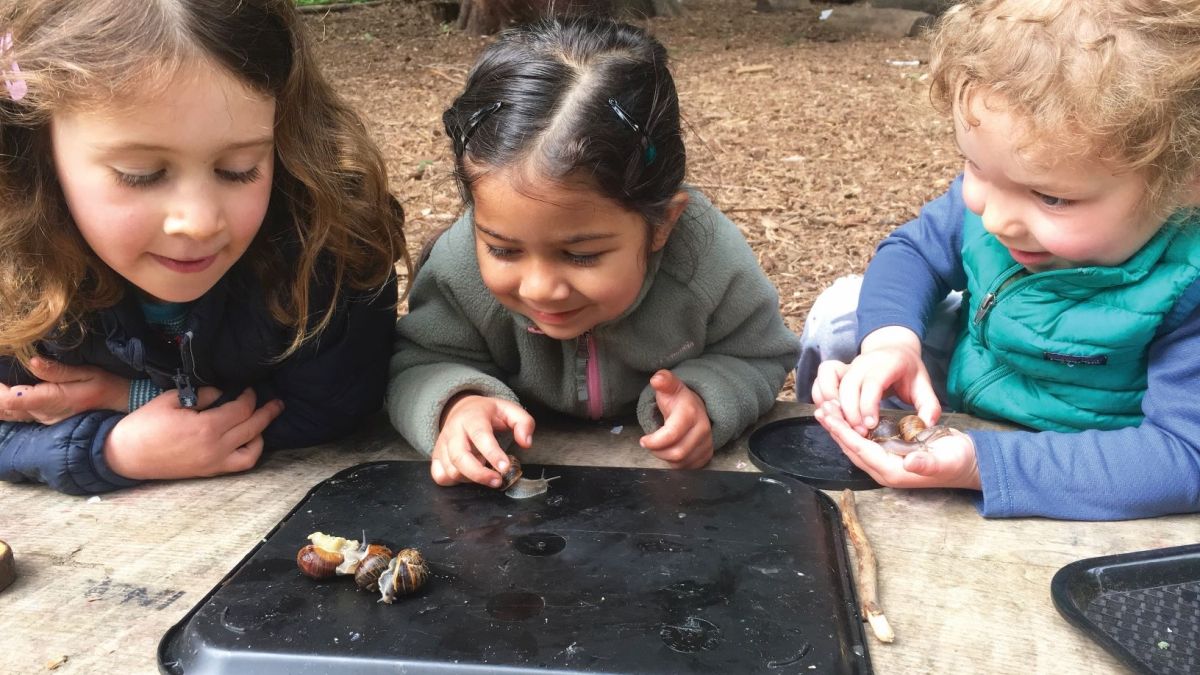
Fiddleheads Forest School
Bring in Key Stakeholders: In Washington, our legislation included the development of an Outdoor Preschool Advisory Group to provide the opportunity for all interested outdoor preschool stakeholders to have a voice in the development of licensing standards. In my personal experience and conversations with several different program directors, it’s clear that the state’s collaborative approach has been essential for positive outcomes. Sabrina Green, the Executive Director of Squaxin Island reflected that, in the end, “the pilot is a dream coming true… The center worked with our licensor to create policies that allowed us to utilize the outdoor space.” Whether or not all programs choose to participate, ensuring everyone has a seat at the table is essential for developing standards that reflect the field as a whole.
Licensing still has a way to go in Washington. Piloting a new program isn’t easy, and Amber Paulsen of Kaleidoscope preschool explains that “being the first ones, no one knew [what to expect].” If the pilot is to be successful, it is critical that programs continue to participate and opt-in, and until it is fully approved by the legislature, the future of licensed outdoor and nature-based preschools in Washington is still vulnerable. But as new states take up the mantle of licensing advocacy, it is clear that, regardless of where this pilot leads, the landscape has been forever changed. Whatever the future of nature-based early childhood education in this country holds, it benefits all of us to be informed and guided by these early steps in Washington State.
Resources for Further Learning:
- Nature-Based Preschool Professional Practices Guidebook
- Outdoor, Nature-Based Early Learning and Child Care Pilot Project Report
- Outdoor Preschool Pilot Standards
- Washington Nature Preschool Association
Thanks to Sabrina Green & Bert Miller of Squaxin Island Child Development Center, Anne Glaser of Tiny Treks Outdoor Preschool, Amber Paulsen of Kaleidoscope Preschool, Sarah Heller of Fiddleheads Forest School, Sarah Salzar-Tipton of Olympic Nature Preschool and Elise Valsquier for their invaluable input in the creation of this article.
About the Author
Kit Harrington is the co-founder of one of the country's first urban outdoor preschools, the Fiddleheads Forest School at the University of Washington. In 2015, Kit founded the Washington Nature Preschool Association to support the regional growth of nature-based early childhood education and helped to pass and develop the first licensing regulations for outdoor preschools in North America. Kit was part of the writing team that crafted the field's first professional practice guidebook, and currently works as a nature-based early childhood education consultant and advocate, helping develop resources and disseminate the practices across the field. She spends her free time exploring Vermont with her family and searching for the perfect maple creemee.